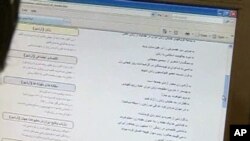Average citizens are using the Internet and mobile phones to fight violence, and the movement is set to grow. That was the message of a two-day London summit in which social media activists from around the world met to explore ways the Internet and mobile technology tools can be used to combat violent extremism.
Jason Leibman, Co-founder of the Alliance for Youth Movement, which organized the event, says Web sites such as the social networking site Facebook, the video-sharing site YouTube, and the micro-blogging site Twitter have become critical tools for fighting extremism.
But he says extremist groups are also often savvy Internet users. "Groups like al-Qaida are extraordinarily sophisticated in how they're using media, which is everything from setting up popular blogs, being on platforms like YouTube, using platforms like Second Life really effectively - so the quote unquote 'bad guys' are often extraordinarily effective at using these tools - much more effective than those that are trying to fight against them," he said.
Social media, he says, is a natural extension of traditional media sources such as radio and television. But he says by using the Internet people can get global attention for their cause cheaply and easily.
And he says all over the world people are using the Internet to fight what they see as injustices. He says, for example, that the micro-blogging site Twitter has been used to combat media censorship in Iran. "You know, one of the reasons it's been so widely used in Iran is that it's a great tool for people that are being blocked off often times from media coverage, from the Internet even, to get up and broadcast their messages to the world," he said.
Colombian Oscar Morales Guevara set up a Facebook group in January 2008 against the insurgent group Revolutionary Armed Forces of Columbia. Morales called for a massive march against the guerilla organization, and through Facebook rallied over 12 million people who marched in over 200 cities around the world.
Its supporters included Colombia's president, Alvaro Uribe and the country's most influential newspaper El Tiempo - but Morales says the movement was not led by politics. "We had no engagement whatsoever with any political parties, we were just regular citizens expressing ourselves, demanding that our voice be heard," he said.
He says the Internet has given people the power to be independent. "One of the things that Internet has is that we can have our own voice, our own movement, without having to rely on governments, or on traditional media. Facebook itself is a media," he said.
Pastor Kingsley Bangwell, from the Nigeria-based Youngstars Foundation, which gets young people involved in social development projects in Africa, says right now the use of Internet is not sufficiently widespread in Africa to be as useful a tool.
But mobile phones, he says, are changing lives. According to the United Nations, mobile subscriptions in Africa rose from 54 million to almost 350 million between 2003 and 2008, the quickest growth in the world.
And, Kingsley says, mobile phones are used for everything from sending money to buying food in a market.
And he says they're increasingly used by young people for political purposes. He says young people in Nigeria are using their phones to raise awareness about the next election. "Right now as we're talking young people are mobilizing, gathering phone numbers because they want to engage in huge text message mass campaign and all of that, so it's also going to play a very critical role in the forthcoming election. I'm hearing that is happening also in Ghana, I'm hearing that Cameroon is mobilizing around that -- people are beginning to understand the power of using telecoms for campaigns," he said.
According to Internet marketing research firm Miniwatts Group, there are about 1.7 billion Internet users worldwide. In Africa it says there are 67 million, up from only 4.5 million users in 2000.
Activists See Social Media as Key Tool in Fight Against Extremism




